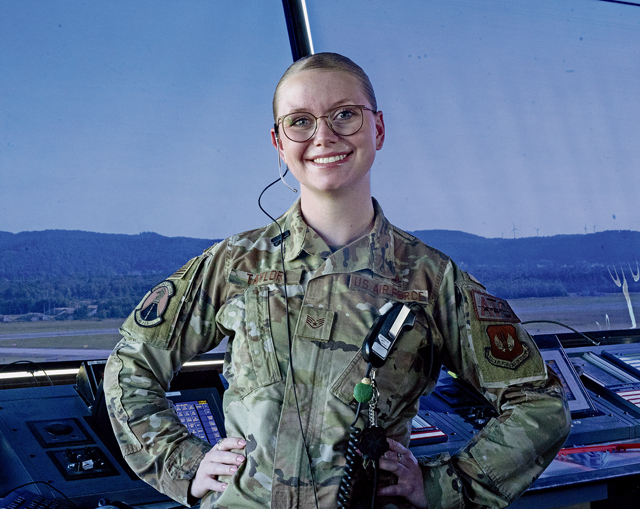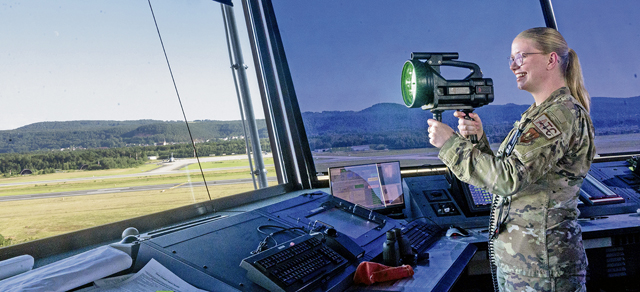
Everyone who joins the military does it for different reasons. For some, it is an opportunity to carry on a family tradition of service, or for others it may be an opportunity for education and travel. Whatever the reason, it can take time to settle into each niche career field necessary to keep the U.S. Air Force a well-oiled machine. A key part of this machine is air traffic control.
“I was very lucky to be able to join and receive Air Traffic Control as a job,” said U.S. Air Force Tech. Sgt. Randy Mullis, 86th Operations Support Squadron Air Traffic Control Tower assistant chief controller. “When I first joined I didn’t know what Air Traffic Control was, but I can not see myself doing any other career; this experience has been very fortunate.”
Pilots fly planes, but navigating through air space and to the flightline can be difficult due to air traffic. Luckily, that’s where air traffic controllers come in to safely guide pilots around the clock, continuously keeping their attention to detail sharp.
“Air traffic control is a crucial service that manages the safe and orderly flow of air traffic in the skies and at airports,” said Mullis.

The primary role of ATC is to prevent collisions between aircraft and to provide timely instructions to ensure safe flight operations. Controllers use radar, communication systems, and weather data to provide instructions and updates to pilots. This also includes coordinating with other ATC facilities and responding to any emergencies that may arise.
In 2023 Ramstein averaged 20,000 annual operations supporting aircraft from the 86th Airlift Wing and other aircraft of NATO and the DOD. Ramstein’s controllers average 60 to 100 operations daily, aptly displaying its nickname of the Global Gateway.
While making judgments about aircraft sequencing and separation in real time, air traffic controllers concentrate on making sure that daily operations proceed smoothly. The role’s requirements may be demanding, but there are some that enjoy the complexity and variety of the work. The days are unique and bring new challenges that call for creative solutions to be implemented.
In addition to helping avoid delays or safety issues that could impede critical missions such as troop deployments, humanitarian relief, or international crisis response, air traffic controllers are in charge of controlling the airspace where military and civilian flights overlap.
“Air Traffic Controllers are inherently tied to the very core of the Air Force,” said U.S. Air Force Tech. Sgt. Vincent Coleman, 86th OSS ATC tower watch supervisor. “We are tied to every mission worldwide that involves manned and unmanned airframes. Through our many specializations and qualifications, controllers ensure that our pilots are safe on the ground and in the air, to be ready at any moment the Air Force needs them.”
Despite the unique challenges and duties and the competition from civilian companies in need of ATCs, the unique experience of the Air Force is hard to replicate.
“All jobs have their downsides and being an Airman is no different,” said U.S. Air Force Tech. Sgt. Adrian De La Cruz, 86th OSS ATC air traffic controller. “However, the benefits of serving in the military, steady employment, exciting opportunities to further career progression, ever-increasing responsibility and challenges as you rank up, are well worth it.”
De La Cruz explained the job of an air traffic controller is both challenging and rewarding. The work is varied, so controllers never have a dull moment and enjoy solving issues and the exhilaration that comes with controlling a busy airspace.
The responsibility of keeping numerous aircraft safely separated in real time is one that few other jobs can match. However, there are also drawbacks to the job, such as irregular hours and shift work, which can disrupt sleep patterns and personal lives.
Coleman said controllers recognize the difficulty of their tasks, but many believe the benefits both in terms of job satisfaction and the unique opportunities provided by the Air Force are worth the challenge.
“I decided to stay in the Air Force because it has created a lifestyle that has allowed me to be financially secure, travel the world, and attain a college degree all while gaining valuable experience inside of a career field that will be heavily marketable after I retire,” said Coleman.
Mullis also stayed in the Air Force as an Air Traffic Controller because of the enjoyment the job brings him, the travel opportunities, and the unique experiences, but also because of the support he receives for his son, who was diagnosed with autism.
Upon his diagnosis, the level of care that we have received has been amazing — from his teachers and referrals to off-base therapy agencies, it has been going increasingly well,” said Mullis. “Since his diagnosis, Tricare has covered an iPad for him to communicate with, his daily speech appointments, and therapists. He has not started talking yet, but he can say some words and his vocabulary increases daily, additionally he has learned to sign certain words.”
While many civilian job opportunities exist with higher pay and better schedules, the Air Force provides air traffic controllers with unique opportunities such as worldwide travel, health care benefits, global assignments, and direct assistance for essential operations which can be highly rewarding for those who want challenges and mission-driven work.


